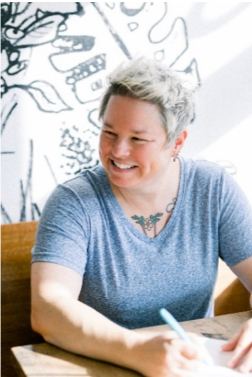
Hello! I’m Libby Smith (@work_with_libby on Twitter), an educator and evaluator at the University of Wisconsin – Stout. My work focuses on building equity and accessibility through holistic personal growth & embodiment practices. I’ve been Program Director for the Master of Science in Applied Psychology since 2013. We prepare students to be applied researchers and evaluators in a variety of contexts.
There has been significant discussion over the past few years (including development of the International Society for Evaluation Education) about the role of graduate education in training evaluators. I have been heartened to see the increasing number of people centering the need for teaching interpersonal skills for evaluators! Our program has been on the forefront of this trend with a core objective of Interpersonal & Teamwork Skills and offering a course in Interpersonal Effectiveness, designed by Dr. Tiffany Smith (@tiffany7001), for the past 5 years. I’ve had the pleasure of teaching that course for two years.
Some of the most important objectives of this course focus on personal growth, reflective practice, and perspective taking. Typically, interpersonal training happens implicitly, in the context of applied projects with real world clients that students engage in beginning in their first semester. However, having a course dedicated to thinking through interactions, communication, and reflection on the self in-context provides intentional space for learning these skillsets.
Hot Tip! Consider these three critical interpersonal skills. Here at UW-Stout, we think they are central to quality practice.
- Yes, it might seem like graduate students should arrive with Listening Skills, but listening is something we can all work on, and is key to good evaluation practice. It’s essential that we take ourselves out of the expert role and truly listen to clients and participants. Try using this Rad Resource in class: The Circle Way. It moves us from a place of formulating a response as we listen to a place of deep listening and connection.
- Compassion for others and, perhaps even more critically, our self, is key to good evaluation practice (though perhaps that can feel in opposition to achieving objectivity – I’ll address that in a second). Through reflective practice, mindfulness, and embodiment practices, students learn to grow from failure, release feelings of imposter syndrome, and hold a posture of non-judgment for themselves and others. Breathwork is the Rad Resource I recommend as the fast track to building compassion.
- The final skill is releasing the myth of objectivity. Through reflective practice and perspective taking exercises, students are asked to consider their relationship to truth, to understand that there are different ways of knowing, and that objectivity is often used as a tool for maintaining oppressive systems. Robin DeAngelo’s White Fragility is a Rad Resource for understanding why this is a critical skill.
Hot Tip! Join me and some wonderful colleagues in celebrating interpersonal skills in evaluation at the AZENet conference (Tucson, AZ April 2-3rd). I’ll be covering these topics and more in a pre-conference workshop – Strengthening Your Core: Whole-Hearted Interpersonal Practices!
The American Evaluation Association is celebrating TOE TIG Week with our colleagues in the Teaching of Evaluation Topical Interest Group. The contributions all this week to aea365 come from our TOE TIG members. Do you have questions, concerns, kudos, or content to extend this aea365 contribution? Please add them in the comments section for this post on the aea365 webpage so that we may enrich our community of practice. Would you like to submit an aea365 Tip? Please send a note of interest to aea365@eval.org. aea365 is sponsored by the American Evaluation Association and provides a Tip-a-Day by and for evaluators.

Hi Libby,
My name is Voula and I am a graduate student at Queen’s University in Kingston, ON in the Professional Masters of Education Program. I am currently completing a course in Program Inquiry and Evaluation and I have been introduced to the AEA 365 Blog as part of the course requirement.
I read through your blog and was very interested the concepts of teaching interpersonal skills for students. I agree with your statement that it would make sense that a graduate student arrives with the ability to listen. But the question is how often are we listening to others around us? Are we listening to be able to prove our own point or truly listening to understand the needs of the other person. I believe that everyone truly listened to others, there would be less conflict as the other individual’s thoughts and ideas could be valued. After all, everyone has value to add to a project and when we provide the opportunity to listen we are able to gain insight that we may not have thought of. The old saying two heads are better than one is important in terms of adding more knowledge to a project.
Great piece!
Great resources–thanks, Libby! We can’t intentionally change structures without also changing selves–before, during, and after… iteratively… systemically.